Nsca cscs chapter 2 - Study guides, Class notes & Summaries
Looking for the best study guides, study notes and summaries about Nsca cscs chapter 2? On this page you'll find 23 study documents about Nsca cscs chapter 2.
All 23 results
Sort by
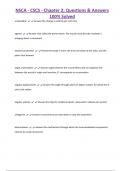
-
NSCA - CSCS - Chapter 2; Questions & Answers 100% Solved
- Exam (elaborations) • 8 pages • 2024
- Available in package deal
-
- $12.99
- + learn more
NSCA - CSCS - Chapter 2; Questions & Answers 100% Solved acceleration Answer-the change in velocity per unit time agonist Answer-also called the prime mover. The muscle most directly involved in bringing about a movement anatomical position Answer-the body is erect, the arms are down at the sides, and the palms face forward
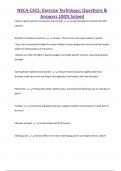
-
FULL BUNDLE::-NSCA CSCS EXAMS WITH COMPLETE SOLUTIONS
- Package deal • 21 items • 2024
-
- $40.99
- + learn more
NSCA-CSCS: Exercise Technique; Questions & Answers 100% Solved 2 Exam (elaborations) NSCA-CSCS Exam: End of Chapter; Questions & Answers 100% Solved 3 Exam (elaborations) NSCA-CSCS Exam Prep: Exercise Science; Questions & Answers 100% Solved 4 Exam (elaborations) NSCA-CSCS Exam Prep; Questions & Answers 100% Solved 5 Exam (elaborations) NSCA-CS
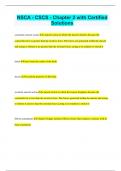
-
NSCA - CSCS - Chapter 2 with Certified Solutions
- Exam (elaborations) • 9 pages • 2024
- Available in package deal
-
- $9.99
- + learn more
NSCA - CSCS - Chapter 2 with Certified Solutions concentric muscle action a muscle action in which the muscle shortens because the contractile force is greater than the resistive force. The forces are generated within the muscle and acting to shorten it are greater than the external forces acting as its tendons to stretch it distal away from the center of the body dorsal toward the posterior of the body eccentric muscle action a muscle action in which the muscle lengthens becaus...
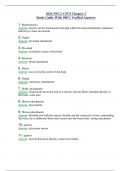
-
2024 NSCA CSCS Chapter 2 Study Guide With 100% Verified Answers
- Exam (elaborations) • 13 pages • 2023
-
Available in package deal
-
- $10.99
- + learn more
2024 NSCA CSCS Chapter 2 Study Guide With 100% Verified Answers 1. Biomechanics Answer: focuses on the mechanisms through which the musculoskeletal compnents interact to create movement 2. Origin Answer: proximal attachment 3. Proximal Answer: toward the center of the body 4. Insertion Answer: distal attachment 5. Distal Answer: away from the center of the body 6. Origin Answer: stationary attachments 7. fleshy attachments Answer: found at the proximal end of a muscle, muscle ...
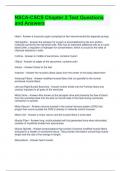
-
NSCA-CSCS Chapter 2 Test Questions and Answers
- Exam (elaborations) • 7 pages • 2024
-
Available in package deal
-
- $13.49
- + learn more
NSCA-CSCS Chapter 2 Test Questions and Answers Heart - Answer-a muscular organ comprised of two interconnected but seperate pumps. Hemoglobin - Answer-the transport of oxygen is accomplished by this iron-protein molecule carried by the red blood cells. Also has an important additional role as an acid-base buffer, a regulator of hydrogen ion concentration, which is crucial to the rates of chemical reactions in cells. H-Zone - Answer-in middle of sarcomere, contains myosin I-Band - An...
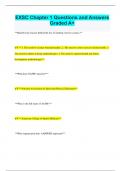
-
EXSC Chapter 1 Questions and Answers Graded A+
- Exam (elaborations) • 9 pages • 2024
-
- $9.99
- + learn more
EXSC Chapter 1 Questions and Answers Graded A+ **Identify four reasons behind the rise of modern exercise science.** **1. The need for science-based principles, 2. The need to correct exercise-related myths, 3. The need for athlete training methodologies, 4. The need for optimal health and fitness development methodologies** **What does NASPE stand for?** **National Association for Sport and Physical Education** **What is the full name of ACSM?** **American College of S...

-
NSCA-CSCS CHAPTER 17/ EXAM REVIEW QUESTIONS AND ANSWER, RAT| latest 2024/25 exams updates |ED A+
- Exam (elaborations) • 24 pages • 2024
-
Available in package deal
-
- $11.49
- + learn more
NSCA-CSCS CHAPTER 17/ EXAM REVIEW QUESTIONS AND ANSWER, RATED A+ Resistance training programs for athletic populations require attention to what principles? - -1. specificity 2. overload 3. progression What is the acronym that is used interchangeably with specificity? - -SAID = Specific Adaptation to Imposed Demands aka the type of demand placed on the body dictates the type of adaptation that will occur Specificity also relates to the athlete's sport season. As an athlete progresse...
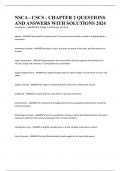
-
NSCA - CSCS - CHAPTER 2 QUESTIONS AND ANSWERS WITH SOLUTIONS 2024
- Exam (elaborations) • 5 pages • 2024
- Available in package deal
-
- $14.99
- + learn more
NSCA - CSCS - CHAPTER 2 QUESTIONS AND ANSWERS WITH SOLUTIONS 2024
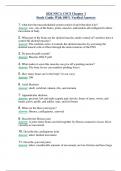
-
2024 NSCA CSCS Chapter 1 Study Guide With 100% Verified Answers
- Exam (elaborations) • 13 pages • 2023
-
Available in package deal
-
- $10.99
- + learn more
2024 NSCA CSCS Chapter 1 Study Guide With 100% Verified Answers 1. what doesthe musculoskeletalsystem consist of and what doesit do? Answer: con- sists of the bones, joints, muscles, and tendons all configured to allow movement of body 2. What part of the brain are the skeletal muscles under control of? and how does it control the skeletal muscles? Answer: The cerebral cortex; it controls the skeletal muscles by activating the skeletal muscle cells or fibers through the motor neurons o...
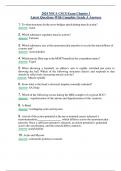
-
2024 NSCA CSCS Exam Chapter 1 Latest Questions With Complete Grade A Answers
- Exam (elaborations) • 10 pages • 2023
-
Available in package deal
-
- $10.99
- + learn more
2024 NSCA CSCS Exam Chapter 1 Latest Questions With Complete Grade A Answers 1. To whatstructures do the cross-bridges attach during muscle action? Answer: Actin 2. Which substance regulates muscle actions? Answer: Calcium 3. Which substance acts at the neuromuscular junction to excite the musclefibers of a motor unit? Answer: Acetylcholine 4. Which muscle fibertype isthe MOST beneficial for a marathon runner? Answer: TypeI 5. When throwing a baseball, an athlete's arm is rapidly st...

How did he do that? By selling his study resources on Stuvia. Try it yourself! Discover all about earning on Stuvia


